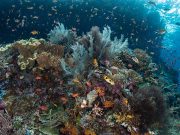science
Home science
Researchers find dolphins to be far more similar to humans than previously thought.
For those who have ever observed monkeys and apes – our closest evolutionary cousins – in the wild, in a zoo,...
99.8% of shark fins come from Indo-Pacific: conservation efforts in Atlantic Ocean are working
What makes the Cuttlefish so good at controlling its colour and blending in with its surroundings? This month scientists at Harvard University and the Woods Hole Marine Biological Laboratory have helped answer that question.
It has been long known that...
Take part in the Shark Trust's community science project and to help gather vital information about global shark distribution. During the last week in July 2022 they want buddy pairs, dive centres, clubs and boats to record...
What happens to baby turtles after they scramble off the sandy beaches where they are born and swim into the open ocean?
Shark feeding dives are increasing, yet are controversial. Shark tourism has great economic benefits, and can help shark conservation. What are the drawbacks?
Dugongs have been documented in China for hundreds of years, but now scientists have concluded that they are functionally extinct there.
A simple bottle of seawater shows the identifiable tracks of numerous species of shark - no need for baiting, hooking, filming or tagging.
Gorgeous new book explains all - a must for all nudibranch lovers
Researchers solve some of pulsating soft coral (Xenid) mysteries, but their siestas still unanswered.



























